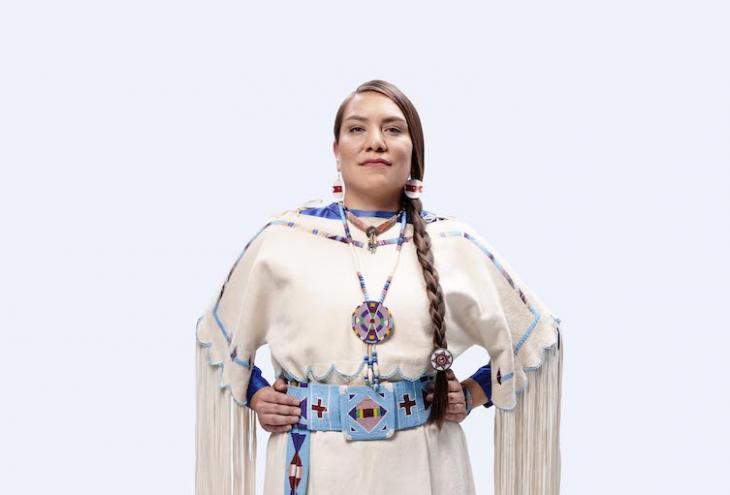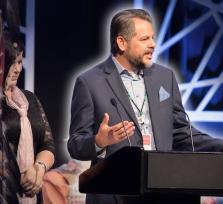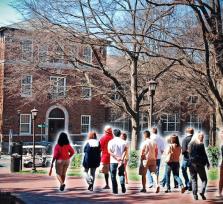The first Native American to complete a doctoral engineering degree at Cornell University, Dr. Grace Bulltail is as committed to building bridges between students and potential mentors as she is to promoting education. Then again, strengthening relationships and advancing education are part of her heritage. Dr. Bulltail, Crow, Mandan, Hidatsa, and Arikara Nations, was raised on the Crow Reservation in Montana by her paternal grandparents. In this close-knit community, traditional ways and the Crow language are commonplace.
“My Crow heritage is central to my identity and my values, including a strong sense of the importance of education,” says Dr. Bulltail, who returns to the reservation every summer and for the Crow Fair. “It’s a weeklong reunion of family members and friends and helps me maintain my connection to my people.” Her current postdoctoral field research also brings her back to portions of reservation lands.
Dr. Bulltail’s affinity and talent for STEM fields were evident early. As a seventh-grader, she started attending AISES summer camps and learned the importance of mentors. She still keeps in touch with one of her early mentors, Dr. Freda Porter. Dr. Bulltail’s family has also been crucial to her success. One of nine children, she recalls her grandmother visiting her while she was at a boarding school in New Hampshire. “I couldn’t have done it without my family’s support,” Dr. Bulltail says.
Her subsequent academic path led to her current role as a California Alliance postdoctoral scholar in the department of Earth System Science at Stanford University. Along the way she chalked up an impressive list of accomplishments: a National GEM Consortium Fellowship; Sloan Indigenous Graduate Partnership Fellowship; National Science Foundation Integrative Graduate Education and Research Traineeship Fellowship; and Cornell Colman Fellowship. What’s more, Dr. Bulltail says her experience as an engineering instructor at United Tribes Technical College in Bismarck, N.D., helped her realize how important it is to build academic programs and achieve the foundational credentials to be an effective faculty member.
Dr. Bulltail earned her undergraduate degree in civil and environmental engineering from Stanford University. She went on to receive two master’s degrees, in project engineering management and earth resources engineering, from Montana Tech and Columbia University, respectively. Although it was outside her academic area, the Federal Indian Law course Dr. Bulltail took in grad school played an important role in sharpening her focus. “I was curious about how policy affects tribes’ management of water resources,” she says. “This course gave me an advantage for pursuits involving tribal self-determination and sovereignty.”
I am the first in my family to receive a doctorate. You have to have the resolve and maturity to complete the research work you started.
Dr. Bulltail earned that Native American “first” — a PhD in biological and environmental engineering from the College of Agriculture and Life Sciences at Cornell University — with dissertation research on the impact of natural resource development on water quality in tribal communities. “Cornell Engineering has great scholarship resources and programs in addition to dedicated program directors,” she points out.
The road to these academic achievements was not always smooth. Dr. Bulltail explains that doctoral programs are especially challenging because they require students to forge new pathways in their fields, which can make students second-guess themselves. “Working in uncharted territory can be daunting, not only academically but also personally,” she says. “I am the first in my family to receive a doctorate. You have to have the resolve and maturity to complete the research work you started.”
Impostor syndrome — a pervasive self-doubt that can strike smart, successful individuals — is another potential pitfall. “I’ve had impostor syndrome along all phases of my schooling,” says Dr. Bulltail. “It’s especially true of those in marginalized groups, such as Natives, to feel they aren’t supposed to be where they are, regardless of their accomplishments. I don’t think that feeling ever really goes away.” One solution, she believes, is to ensure that students have a strong support network of mentors.
Dr. Bulltail is finding ways to further support students as a member of the AISES Board of Directors (she also serves on the Winds of Change Editorial Advisory Council, which helps plan future issues). In addition, events like the AISES Leadership Summit provide opportunities to increase support for students. “The summit is also a great way to build AISES within academic communities,” Dr. Bulltail notes. “These events can boost the academic pipeline up to the level of postdoctorate STEM students while enhancing the organization.”
She also had a hand in helping plan and lead this year’s AISES Region 2 Conference at Stanford, where students had the chance to network with professional members and share research. “Building connections is beneficial to all involved on many levels,” she says.














